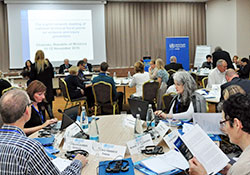Injury surveillance workshop for south-eastern European countries

Andrei Mardari
20 participants from 8 south-eastern European countries attended an expert meeting on the surveillance of non-fatal injuries on 12–13 November 2015 in Chisinau, Republic of Moldova. WHO/Europe, with support from the Norwegian Directorate of Health and the Moldovan Ministry of Health, organized the workshop for focal points in violence and injury prevention from health ministries.
The meeting was opened by the Moldovan Deputy Minister of Health Dr Gheorghe Turcanu and Mr Jakob Linhave, Deputy Director General, Department of Public Health, Norwegian Directorate of Health, on behalf of the Norwegian Government. The goal was to take forward the expertise in injury surveillance that had been developed in the subregion, in order to better describe the large burden from injuries and to advocate for preventive and policy action.
Participants reported on progress achieved in their countries. In some countries, half the hospitals collected the minimum dataset to describe the intent and mechanism behind the injury, the place where it happened and the activity that provoked the incident. Others were on the cusp of changes in information gathering and reporting, which was facilitated by the evolution to electronic health records. Other outstanding constraints which could be further overcome by investing in building capacity among health professionals about the importance of using such data for prevention and to advocate to policy-makers for using such data for preventive action.
Dr Johan Lund, Senior Adviser, Norwegian Directorate of Health, described the Norwegian injury surveillance system and urged focal points to focus data collection efforts in centres of excellence. Getting a representative picture from these hospitals is more cost-effective than trying to get a comprehensive picture from all hospitals.
Dr Rupert Kisser, Senior Researcher, European Association for Injury Prevention and Safety Promotion, described the Injury Data Base and the regulation requiring European Union (EU) countries to collect and report the minimum dataset to Eurostat. A project is underway engaging EU and ascension countries to join in these data collection efforts.
Dr Dinesh Sethi, Programme Manager ,Violence and Injury Prevention at WHO/Europe, described WHO's efforts in building capacity using injury surveillance for advocacy such as:
- "European facts and the Global status report on violence prevention 2014"
- "European facts and the Global status report on road safety 2015"
- Training, Educating, and Advancing Collaboration in Health on Violence and Injury Prevention (TEACH-VIP).
The workshop was evaluated very highly and participants affirmed the utility of these meetings in building local capacity.



